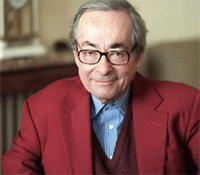Faculty of Translation and Interpreting to pay tribute to Steiner

28/09/2011
The Idea of Europe focuses on the phenomenon of Europe. It is a story about European civilisation which was first pronounced by Steiner at a conference at the Nexus Institute in Amsterdam. Víctor Compta translated the work into Catalan, with a prologue by Rob Riemen (Arcadia).
The work discusses the weariness of history, whose heavy weight falls on us with each episode of brutal atrocities, but which at the same time is the history of both individual and collective conquests. Steiner alerts of the dangers of the numbing of society which needs to be combat with the values born in the Age of Reason. According to the author, Europe must assume responsibility for its own history before it can project an idea of its future. Steiner states that although having a culture does not free us from acts of barbarism, ignorance surely leads us faster to them.
George Steiner (Paris, 1929) is one of the most important thinkers of our times. With a vast knowledge of the humanities, he specialises in comparative literature. His work as a critic tends to explore everlasting cultural and philosophical issues and to be of great influence to cultural debates taking places in the past decades.
He has taught in some of the best universities in Europe and United States, including Princeton, Innsbrück, Cambridge and Geneva. Some of his most famous works are Tolstoy or Dostoevsky: An Essay in Contrast and Ten (Possible) Reasons for the Sadness of Thought. He collaborates in journals and newspapers such at The New Yorker, The Times Literary Supplement and The Guardian. Among his many awards, he received the Légion d'honneur from France and Fellowship of the British Academy, as well as the Prince of Asturias Award in Communication and the Humanities in 2001.
More information:
Faculty of Translation and Interpreting
Òscar Intente